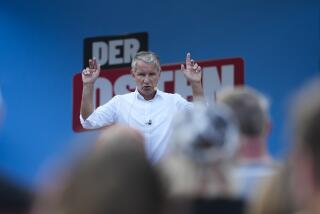East German Party Votes to Change Name
- Share via
EAST BERLIN — East Germany’s Communist Party decided Saturday evening to change its official name--a reflection of the disgrace and disarray that now surrounds the once all-powerful institution.
The decision was made at a special, all-day meeting of the party congress, the 2,524 delegates who make up the body that has ultimate political responsibility in East Germany.
Ousted Communist leader Erich Honecker made a written report to the congress in which he admitted making mistakes during his 18-year hard-line rule but denied having abused power.
The 77-year-old, ailing Honecker, in an abject confession, said that he had pretended there were no real problems and “let myself be fooled when I traveled around the country.”
But the congress heard a sharp investigative report describing Honecker as an “arrogant, absolute ruler.”
The report said that Honecker’s regime amounted to “Stalinism in East German colors” and described the period as a “swamp of corruption.”
Soviet President Mikhail S. Gorbachev sent a message to the congress, supporting the reforms under way in East Germany, which he called a “cleansing storm” to wash away the problems.
Adopting a new name for the party was the congress’ only decision Saturday night, and it was mostly a symbolic action.
Ever since it assimilated the small Social Democratic Party shortly after World War II, the Communist Party’s formal name has been the Socialist Unity Party, often referred to by its German initials, SED. The new formal party name, which analysts say doesn’t appear to change much, is the Socialist Unity Party of Democratic Socialism.
In its first emergency meeting last week, the special party congress chose 41-year-old Gregor Gysi, a lawyer and party reformist, as new party leader, replacing Egon Krenz, Honecker’s successor.
Gysi is expected to give a lengthy report on the future directions of the badly-battered party at today’s closing session.
As speaker after speaker in the congress criticized the Communist regime, the 52-year-old Krenz, who ruled for only 47 days, listened gloomily from the sidelines. He was among the former leaders castigated by the speakers.
“Krenz could have reacted a lot earlier to prevent this crisis of our party and country,” said delegate Rolf Maettig, “but he did not.
“He has to come to grips with his past behavior.”
The chairman of the congress was Dresden Mayor Wolfgang Berghofer, who is one of the more popular young figures in the party.
“We want to start at zero and show that we can run things cleanly,” he told the congress.
Behind him on the dais sat the party’s other best-known reformist leader, Prime Minister Hans Modrow, the former party chief in Dresden who will meet West German Chancellor Helmut Kohl in Dresden on Tuesday.
One speaker who caused a stir in the audience was Rudolf Bahro, an East German intellectual who returned to East Berlin this month after eight years of enforced exile.
Bahro followed a strongly Marxist line in his long talk, warning against letting East Germany “fall into the hands of capitalism.”
He spoke much longer than his allotted time and was greeted by jeers and laughter when he insisted that East Germany must give up industrialization and concentrate on farming and ecology.
But at the end of Bahro’s rambling speech, Chairman Berghofer defended him, declaring that the audience had “paid off a little bit of those eight years by listening.”
More to Read
Sign up for Essential California
The most important California stories and recommendations in your inbox every morning.
You may occasionally receive promotional content from the Los Angeles Times.













